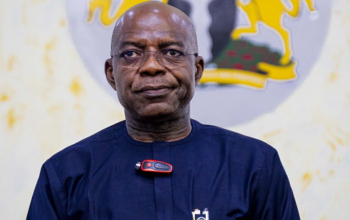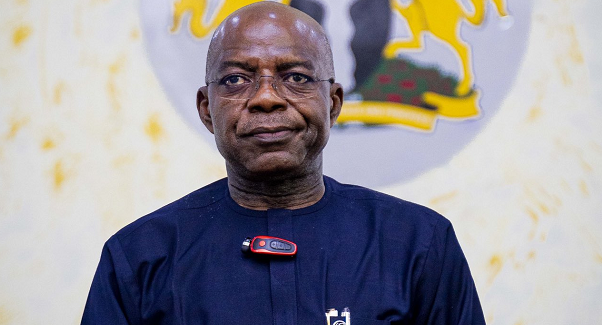Written by Onyinyechi Obi
Today, December 17, 2024, marks a historic milestone for Abia State as the much-anticipated groundbreaking ceremony of the Abia International Airport takes place at Community School Ubaha Nsulu, Isiala Ngwa North. The event, which would be jointly performed by the Abia State Governor, Dr. Alex Otti (OFR), with the Honourable Minister of Aviation, Festus Keyamo (SAN), signifies a giant leap in the development of the Southeast region. This ambitious project, born from collaboration between federal and state governments, reflects a shared vision for progress, connectivity, and economic transformation.
The airport project began as a modest federal initiative aimed at constructing an airstrip in Abia State. However, under the visionary leadership of Governor Alex Otti, this plan was elevated to a full-fledged airport. Recognizing the transformative potential of such a facility, the state government successfully convinced federal authorities to scale up the project. This collaborative effort highlights a commitment to innovation and regional growth, with federal support strengthened by the involvement of key aviation agencies such as the Federal Airports Authority of Nigeria (FAAN), Nigerian Meteorological Agency (NIMET), Nigerian Civil Aviation Authority (NCAA), and Nigerian Airspace Management Agency (NAMA).
In addition to federal backing, the project has attracted private sector interest, with Access Bank expressing its readiness to partner on this transformative initiative. Once completed, the airport is poised to become a catalyst for trade, tourism, and investment, enhancing Abia’s position as a hub for commerce and industry.
Governor Alex Otti’s administration has further demonstrated its commitment to the project by undertaking the critical task of constructing a state-of-the-art runway, the defining feature that distinguishes an airport from an airstrip. This ensures the facility will meet international standards, accommodating larger aircraft and fostering greater regional and global connectivity. Strategically located between Aba and Umuahia, the airport will serve as a gateway to new economic opportunities, linking Abia to national and global markets.
Moreso, the decision to relocate the project from its original site to Nsulu reflects the pragmatic leadership of Governor Otti. The first site had become heavily built-up, rendering it unsuitable for the project. Constructing the airport there would have required extensive demolition and compensation, but the new site in Nsulu avoids these challenges, offers room for future expansion, and enhances the airport’s accessibility.
However, change often comes with resistance. Initially, some members of the Nsulu community expressed concerns about the project, with the fear that it might disrupt their livelihoods. Nevertheless, through persistent engagement and dialogue, the administration of Dr. Alex addressed these concerns and secured their widespread support.
Through the administration’s consistent and transparent engagement with the community, the Chief of Staff to the Governor, Pastor Caleb Ajagba (Ph.D.), played a pivotal role in fostering understanding between the government and the people. He engaged traditional rulers, community leaders, and individual stakeholders, assuring them that the government would prioritize their interests and well-being, he reassured the community that no land would be taken without adequate compensation. This transparent and empathetic approach not only eased tensions but also nurtured a deep sense of trust and ownership among the people. As a result, the community has embraced the project with open arms, enthusiastically ready to host the Abia Airport. Their confidence in this administration’s commitment has sparked excitement for the long-term gains the project promises. Now, they eagerly look forward to the opportunities it will bring, supporting it with unwavering dedication and a shared sense of pride. Pastor Ajagba’s efforts were further complemented by the Special Adviser on Lands and Housing, Pastor Okorugo Aji, whose contributions reinforced this human-centered approach, laying a strong foundation for lasting collaboration and a unified vision for prosperity.
In sustaining the trust established between both parties and in response to community concerns, the state government reduced the land allocated for the project from 1,880 hectares to 1,300 hectares. Youths from the communities were engaged in land tracing and preparatory activities, minimizing reliance on heavy machinery. This approach not only reduced environmental disruption but also fostered a sense of inclusion and ownership among the local population. This adjustment highlights the administration’s commitment to listening to the concerns of the communities and adapting its plans to ensure the benefit of the people. Today, communities such as Ubaha, Umuala, Ikputu, Umuosu, Umuezekwu, Umuode, and Umuomainta Nbawsi have embraced the project, recognizing its transformative potential and the opportunities it will bring to improve their livelihoods
The Abia Airport is more than just infrastructure; it represents hope, opportunity, and development. Alongside the airport, there will be accompanying infrastructure such as an Airforce base, a five-star hotel, improved roads, electricity, and a modern drainage system to prevent flooding in surrounding areas. The project also opens opportunities for the development of logistics hubs, warehousing facilities, and business parks to support commercial activities. These investments will create thousands of jobs, support local businesses, and attract industries to the state. In addition, the airport is expected to spur improvements in healthcare and educational facilities as the surrounding communities grow and thrive. The project will also boost the state’s tourism industry, opening Abia to a new wave of visitors and investors, while encouraging the development of hospitality and cultural heritage sites to accommodate and engage them
As the groundbreaking ceremony unfolds today, one cannot help but reflect on the words of Albert Einstein: “In the middle of difficulty lies opportunity.” The challenges faced and overcome during the planning of the Abia International Airport highlight the resilience and vision of the Otti administration. This airport is not just a structure; it is evidence to what is possible when visionary leadership aligns with the collective aspirations of a people.








